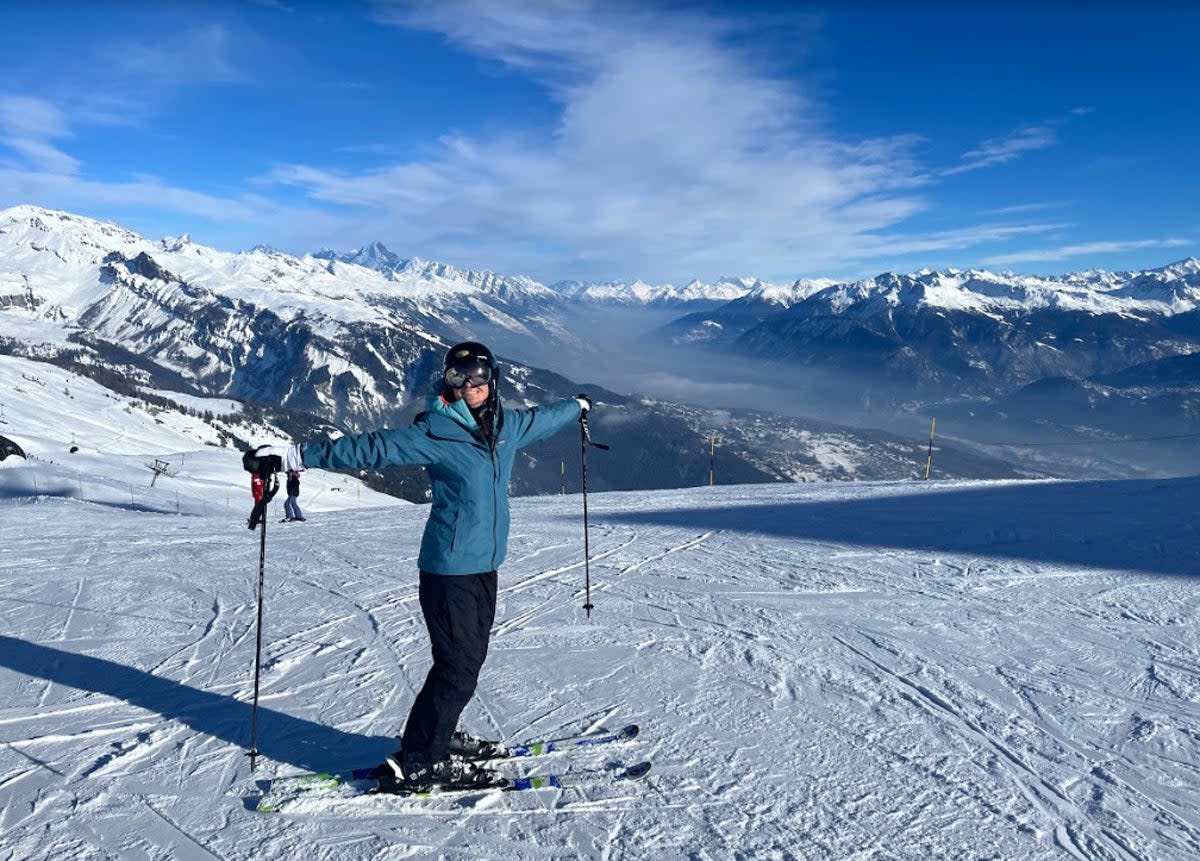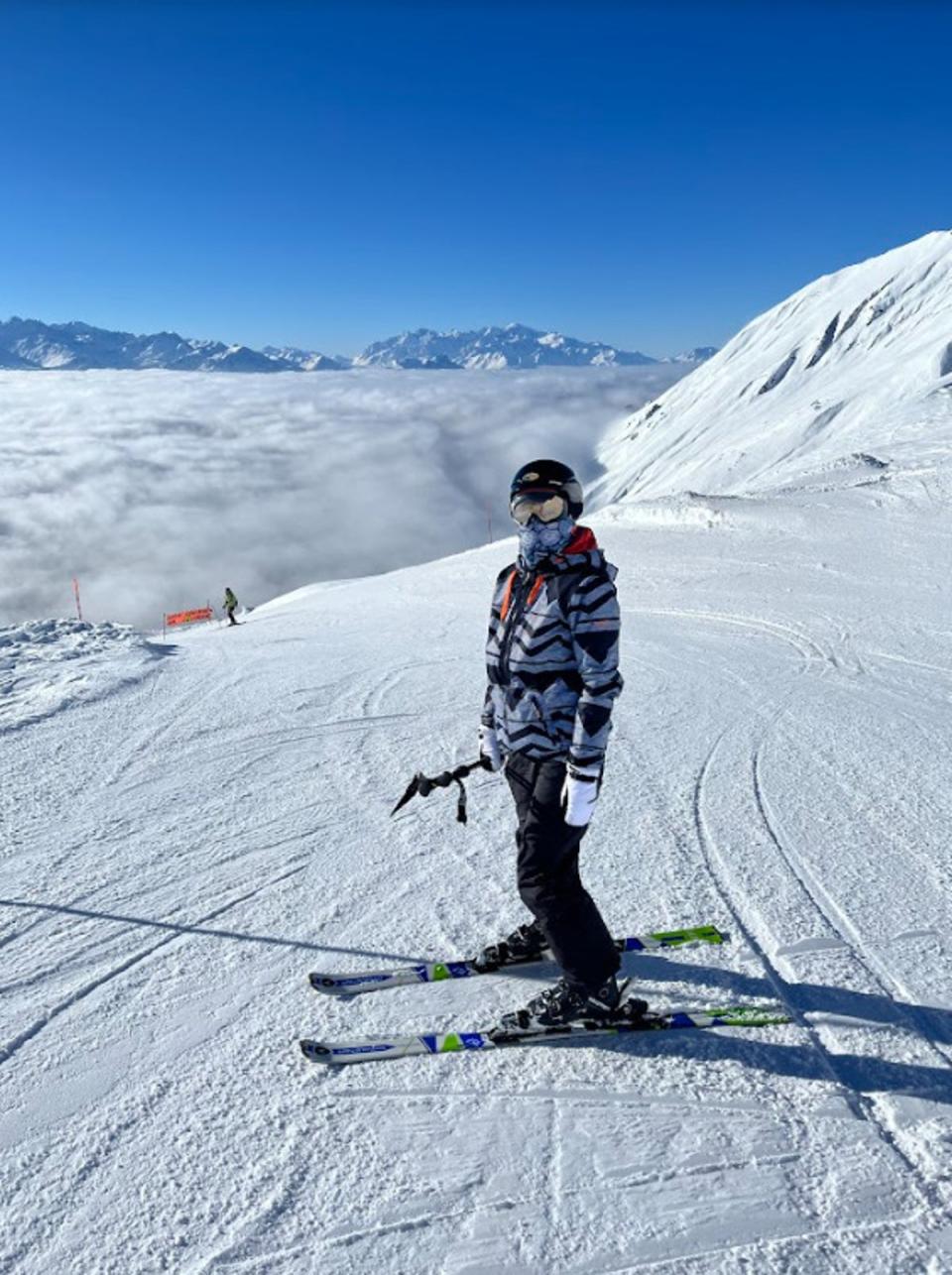‘The world’s most sustainable ski trip’ – from London to the Swiss Alps

“Wow, how long did that take? A couple of days?” a friend has just asked me, on hearing that I took the train to my ski holiday in the Alps. Two days might seem like a reasonable guess — the Swiss Alps are a long way away, after all — until you consider just how quick and convenient travelling across Europe by train really is.
Less than 10 hours after walking into St Pancras International station in London, we are stepping on to the platform at Sion in the Valais, ready to be whisked up the steep mountain roads in time for a beer before the sun goes down. The après-ski starts now, even if the skiing itself has to wait until tomorrow.
This is my first time on the slopes, in what has been called “the world’s most sustainable ski trip” by the organiser, Ed Hopkins from Dark Green PR. A lifelong skier, Ed’s passion is to push skiing on to a green trajectory as quickly as possible. Otherwise, the snow-less slopes that we saw at Christmas and New Year will be a recurring theme.
"It’s about demonstrating what’s possible," he explains as we whizz through the Channel Tunnel on the Eurostar. "Ski resorts understand what needs to be done, but they’re not doing it. I wanted to put a trip together and say, ‘here, this is how you keep emissions down and still have an amazing ski holiday’".
“The industry urgently needs to move away from the luxury, steak-and-raclette, jet-set model, otherwise it won’t survive.”
The industry urgently needs to move away from the luxury, steak-and-raclette, jet-set model, otherwise it won’t survive
Ed Hopkins, Dark Green PR
Arriving in our resort of Anzère, we are surrounded by hundreds of other skiing enthusiasts from all over Europe, most of whom travelled by plane to Geneva Airport. According to snowcarbon.co.uk, a website that encourages travellers to travel by train to the slopes, well over half of the emissions of your ski holiday come from the flight there.
Travel differently and you can make a huge impact on the environment. The stats are impressive: our journey, involving three electric trains and a metro across Paris, generated only 5 kilograms of carbon dioxide each. This would have been 127kg of CO2 if we’d flown*. Add in to that that our taxi up to the resort, a Tesla no less, charged from a solar panel in the owner’s garden, and we’re doing pretty well.
A lovely side benefit of low-emissions travel is the enjoyability. Give me laptop space, leg room and gazing out of the window any day. A few hours after leaving the UK, we are surrounded by the snow-covered foothills of the Jura Mountains; about an hour later, we are rattling alongside the expansive Lake Geneva, fairytale castle and all. There is time to think, work, chat, sleep, whatever we choose. Time spent travelling is time well spent.
On the first morning, I’m in the beginner’s area, while my more experienced fellow travellers head to the red runs. I’m kitted out with clothing from EcoSki, a company that provides ethical brands on a hire basis — so you can have something new without having something new. The all-important cold-weather accessories have come from my local charity shop or been borrowed from a friend. With the fashion industry’s carbon footprint outpacing even aviation’s , it’s a canny move to avoid unnecessary emissions.

By lunchtime on day two, I’m covered in bruises but I’m making progress, even staying upright —just about — on the 100 yards of black run that stand between me and our lunch spot. All of our food on the trip is plant-based — widely regarded as the most planet-friendly of diets. Although I’m apprehensive that the vegan offerings in a ski resort might not be up to scratch, I’m pleasantly surprised: our cafe, Le Grenier de Zalan, has adapted its delicious polenta raclette for us, and the herby mushrooms on toast are a delight. Then there’s vegetable soup and tarte aux pommes — hearty, warming, tasty food washed down with une bière blonde.
In the evenings, we sample the restaurants in the village, where we’re treated to risottos and burgers — and plenty of frites. The land of Gruyère is not known for its vegan meals, but it’s possible to find them if you ask.
One of the proudest features of Anzère is its biomass plant, the biggest such facility in Europe. This provides heating and hot water to 70 per cent of the properties in the village, saving between 1.5 and 2 million litres of heating oil per year. The vast majority of Anzère’s electricity comes from hydropower, and there’s solar on several buildings.
The resort knows that its winters are at risk and plans are afoot for extended summer activities, for when snowy slopes can’t be relied upon to bring in the tourists. For me, this already feels like giving up. The snow can yet survive — if we fight hard enough for it.
The challenge is huge, though, involving a likely complete overhaul of the industry. There needs to be much more promotion of no-fly routes, with incentives such as free lift passes for those arriving by train.
Moving away from the steak-and-cheese model of dining will be less palatable, but it’s arguably necessary in response to the snow-melting climate emergency.
This has been a flight-free flying visit, and I’m back home after only four days away. My first skiing expedition wasn’t a disaster — I didn’t die or break anything — and on my final morning, I even made it down a red run.
People ask if we should even be skiing at all in a climate emergency, but there’s a lot to recommend it. Not much beats being at the top of a mountain, above the cloud line, under a piercing blue sky, surrounded by snow-laden peaks. If it sounds like a postcard, that’s because it looks like one. It’s a great way to be active, and the tranquil setting, with plenty of fresh air, is the perfect antidote to our hectic, stress-filled lives.
So rather than give up skiing entirely, we need to work out how to do it better. Who knows if I will be back? But if I am, I’ll look for the smaller resorts that don’t use snow machines and run on renewables. I will also ask for vegan meals, knowing that this will help to encourage resorts to put low-carbon, plant-based offerings on the menu.
But, most importantly, for the planet and for my sense of adventure as a traveller, I’ll always arrive by train.
Travel: Eurostar from London to Paris, TGV to Lausanne, Swiss rail to Sion.
*carbon info from RailEurope.com
Anna Hughes is director of Flight Free UK, a charity whose mission is to inform people of the climate impact of aviation and inspire people to travel by other means; flightfree.co.uk

